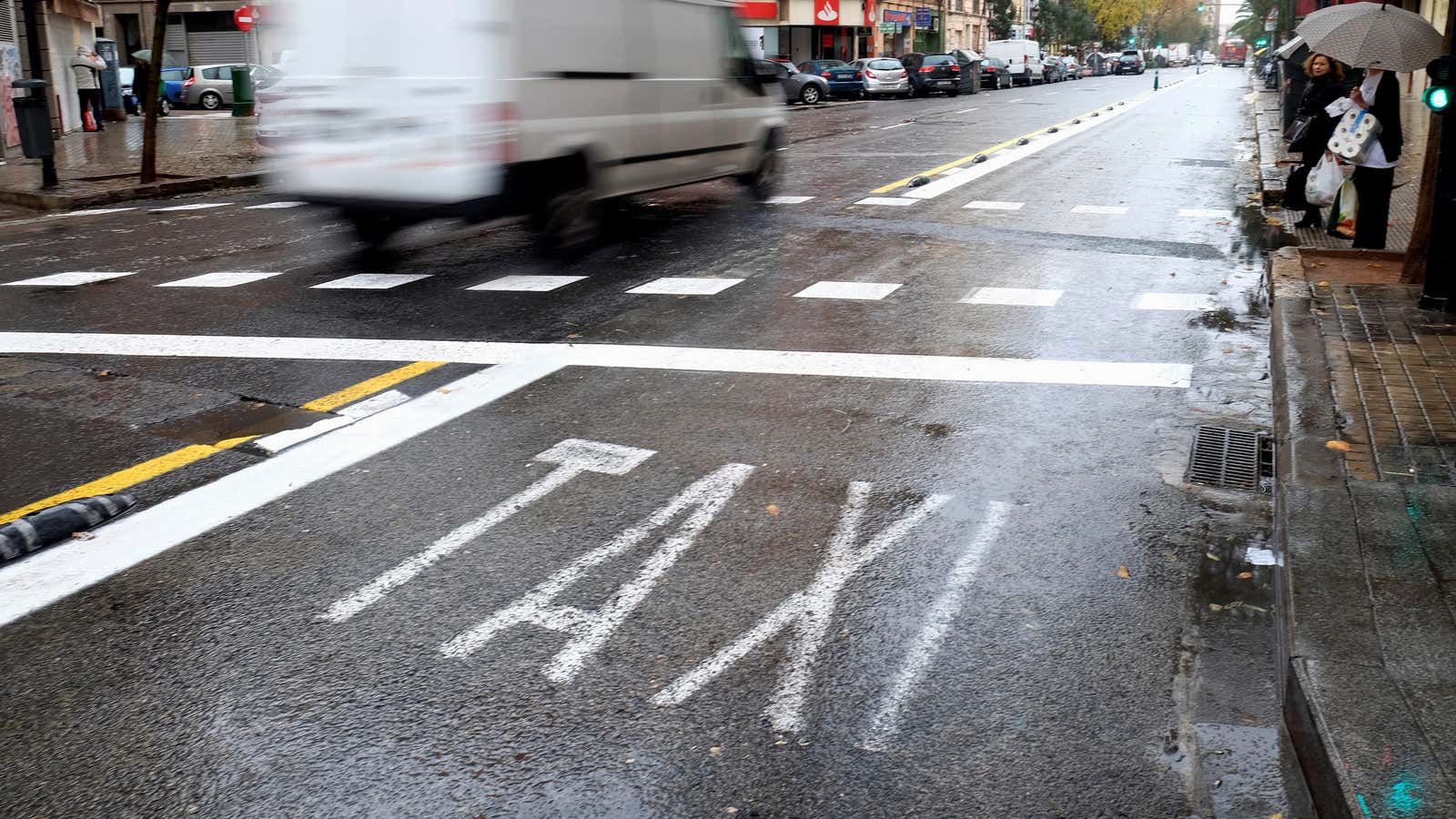Uber’s greatest innovation was never really the technology, though the technology is very good: It was branding itself a technology platform. Those magic words have accompanied Uber since its earliest days, when the startup launched its on-demand ride service in San Francisco and embarked on its quest to convince the world that, despite appearances, it wasn’t really a taxi company.
The distinction mattered because taxi companies were subject to all sorts of burdensome regulations that Uber didn’t want to be bothered with or constrained by. Taxi companies charged flat, metered fares and faced caps that limited how many cars they could have on the road. Taxi companies owned expensive assets like cars and medallions. Taxi drivers had to pass licensing tests and undergo rigorous, time-consuming background checks.
Uber hired drivers to give rides to passengers and charged fares that, at least originally, were based on time and distance. But it didn’t do street hails or buy medallions. It made pick-ups through an app at the touch of a button. Its drivers, for the most part, were regular people rather than licensed professionals. Its fares rose and fell with demand. There were just enough differences for Uber to be not-a-taxi company.
“It’s a technology platform that connects riders and drivers,” Uber co-founder and former CEO Travis Kalanick was fond of saying.
So you can imagine the company’s dismay when, on Dec. 20, the EU’s top court ruled that despite all that—the smartphone app, the non-professional drivers, the dynamic fares, the technology—Uber wasn’t merely a platform that connected riders and drivers, but “must be classified as ‘a service in the field of transport’” and regulated like other taxi operators under EU law.
Uber, in a statement, said the ruling wouldn’t change things “in most European countries where we already operate under transportation law.” The company noted the decision only includes “peer-to-peer” services like UberPop, which use non-professional drivers, compared to the more traditional black car services it already operates with licensed drivers in several EU countries. Uber previously re-launched in Madrid and Berlin after discussions with local authorities.
But the danger in the EU decision isn’t really about where Uber can and can’t operate its peer-to-peer rides. It’s that in December 2017, nine years after Uber was founded, a powerful European court is no longer intimidated by the hard-charging startup, or confounded by the phrase technology platform. It called Uber on its bluff.
The ramifications for Uber are far-reaching because it’s made not one but many bluffs. They include: calling itself a technology platform; assuring riders that it’s safe to get into a car with a stranger; branding dynamic “upfront” fares as better for consumers; classifying drivers as independent contractors rather than employees; and, perhaps most importantly, convincing many of those people that driving for Uber is a good job.
These assertions are core to Uber’s business. Getting people into cars with non-professional strangers helped the company scale rapidly, until it became bigger than the taxi industry. Upfront fares, the second generation of Uber’s infamous surge pricing, let it decouple driver pay from rider fares, to a point where it now charges some people based on their theoretical willingness to pay. Uber, which lost $1.5 billion in the third quarter, believes this highly tailored pricing will make its business more sustainable.
Classifying drivers as contractors has meant Uber doesn’t have to pay them a minimum wage or provide them with standard employment benefits, like health insurance and paid time off. That’s a massive savings for a company with more than 600,000 drivers in the US and 2 million worldwide. Convincing those people that driving for Uber is a good gig has been crucial to keeping enough drivers on the platform for Uber to offer a quick and efficient service, even when the actual economics of the gig can be rather dicey.
Uber’s most central claims were never given all that much consideration, in large part because there simply wasn’t time. The company moved so quickly, first through the US and then the rest of the world, that politicians and regulators were always scrambling to keep up. Uber rarely asked permission to launch its service, instead exploiting gray areas of the law, or brazenly ignoring rules that it found inconvenient.
For years, the strategy worked. Uber was backed by billions of dollars and revolutionizing transportation around the world. Consumers loved it, and often rallied on its behalf. The local officials who represented them saw that Uber filled a need and, swayed by the enthusiasm of their base, were generally willing to excuse the company for bending a law here and there.
Then 2017 arrived, and with it all of Uber’s ghosts. Sexual harassment, scheming executives, an ousted CEO, a shareholder lawsuit, a trade secrets lawsuit, a massive undisclosed data breach, covert surveillance programs, anonymous servers, disaffected employees, dissatisfied drivers, multiple federal investigations. The powerful people who once looked the other way began paying Uber closer heed. The loyal consumers who had carried Uber through past political battles lost faith; some cancelling their accounts, and others switching to Lyft.
The EU court’s decision to call Uber a transportation company must be viewed in this context. Uber spent years behaving as though it were above the law because it could; it moved faster than the law and was protected by the people who loved its service. In 2017, the law caught up. The EU ruling might not change much for Uber’s European operations, but it will encourage other officials in other parts of the world to look more closely at things Uber doesn’t want them looking at: its pricing schemes, its competitive tactics, its controversial employment model.
As 2017 draws to a close, Uber should be scared about what 2018 will bring. It has purged Kalanick and other troublesome executives, but the choices they made can’t be so easily undone. This week’s EU decision was a stinging rebuke to the way Uber has long done business. It won’t be the last.
